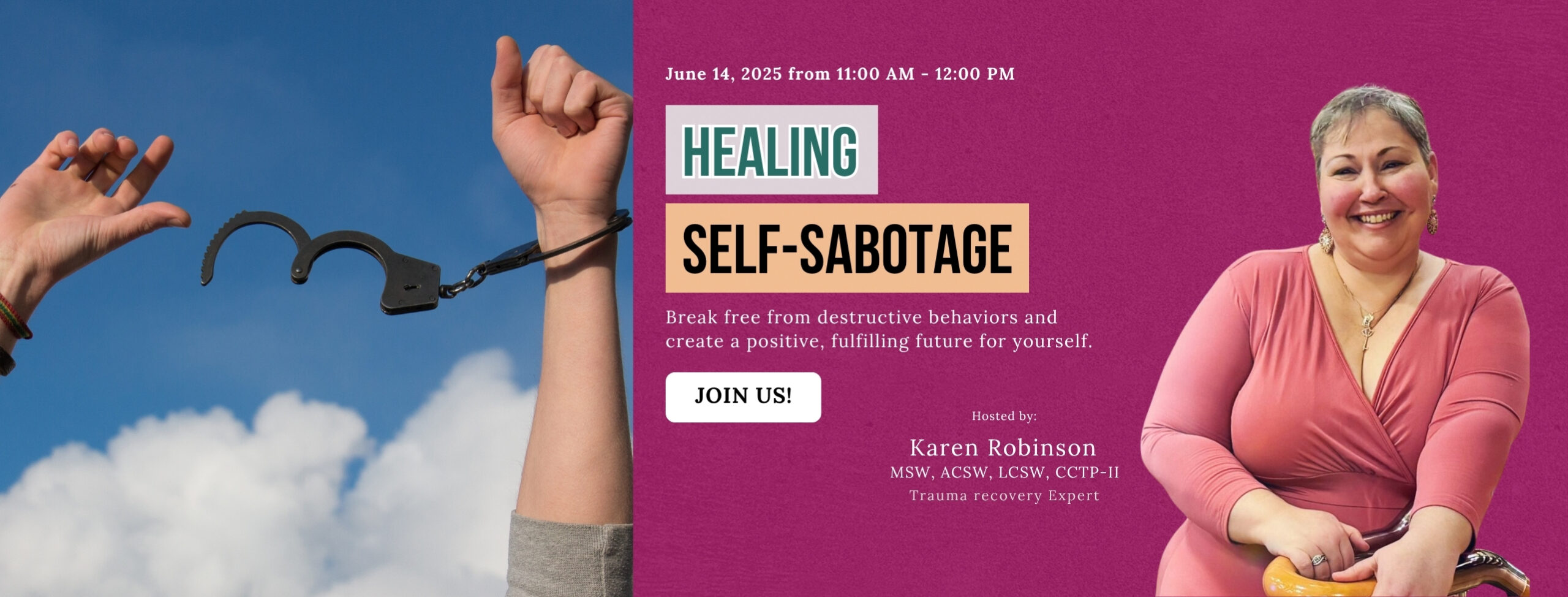You Don’t Intend to Self-Sabotage – There is Hope!
You may not be aware that your pattern of self-sabotaging behaviors stems from your trauma history and are closely linked. Did you know self-sabotage is a way of coping with your past hurts? If you would like to learn more, please register to attend my complimentary intensive healing coaching session here: https://www.healthrivedream.com/healing-Self-Sabotage
Let me now share some key points for you to consider in understanding why you may self-sabotage despite your best efforts:
For Self-Protection
Self-sabotage can be a form of self-protection. You may have a fear of failure, fear of success, or worry about vulnerability which then could lead to you unconsciously undermining your own efforts to avoid these perceived threats. Can you think of a time that this happened to you?
Here is an example of how self-protection can play out in an intimate relationship:
You avoid or prematurely end an intimate relationship due to a fear of being hurt again. You might deliberately distance yourself from potential partners, cancel dates, or push people away emotionally. This behavior protects you from the perceived risk of experiencing emotional pain or rejection, even though it also prevents you from forming meaningful and fulfilling connections.
Negative Core Self-Beliefs
Trauma often leaves survivors with deep-seated negative beliefs about themselves. Sound familiar? You might believe you are unworthy, undeserving, or incapable, leading you to act in ways that confirm these beliefs, even if it's detrimental. Having these negative core beliefs often result in feelings of depression and hopelessness. An important point of negative core beliefs is that there is generally a lack of evidence or no grace in your situation. All of us have worth and value. CBT (cognitive behavioral therapy) can show you how to track your negative core beliefs and change them to healthier thoughts. Please check out my CBT Essentials and Beyond From Basics to Mastery here: https://www.healthrivedream.com/cbt/
Healing Self-Sabotage
14 June 2025, 11:00 AM - 12:00 PM EDT
Your Comfort Zone
You might be or feel more comfortable with familiar negative outcomes than with the uncertainty of positive changes. Self-sabotage keeps you in a known, albeit painful, state rather than facing the unknown. Making any type of change in our habits or behaviors is uncomfortable. You are likely used to how you think, feel, and behave. Being comfortable 24/7 means you aren’t growing, and change is unlikely. Asking you to give up your familiar, comfortable habits may seem unfair, but if you really want healing, growth and create more dreams for your life, taking risks outside of your comfort zone is a must.
Emotional Regulation
Trauma can disrupt your ability to regulate your emotions and this is considered a normal reaction to the abnormal traumatic event(s) that you experienced. Self-sabotaging behaviors might be a way to manage overwhelming emotions, even if it means engaging in harmful actions or avoiding positive opportunities. Think about it like this, you could be subconsciously using risky or maladaptive behaviors to distract yourself from your emotional pain. This does work! Of course only temporarily. The easiest way to learn how to regulate your emotions is focusing on your breath. There are other techniques as well and therapy can be super helpful.
Attachment and Trust Issues
Trauma, especially interpersonal trauma, can lead to difficulties in trusting others and forming healthy relationships. Self-sabotage might be a way to prevent getting close to others and risking further hurt or betrayal. I can’t ask you to start blindly trusting again, but I am asking you to not give up on relationships. Work on healing yourself in a supportive community such as a support group (I love my community: This is Us, Healing From Trauma Together). Also work with a therapist or a coach who specializes in betrayal trauma or interpersonal trauma.
Unresolved Trauma
When trauma is unresolved, it is likely you will replay old patterns and scenarios, leading to self-sabotaging behaviors. Healing and addressing the underlying cause of your trauma can empower you to break these cycles. Understanding your patterns to self-sabotage can be an important step in empowering you to recognize and change your self-sabotaging behaviors, leading to a healthier you.
Please join me during my next intensive coaching session on healing self-sabotage. I would love to host you and it is completely complimentary.



